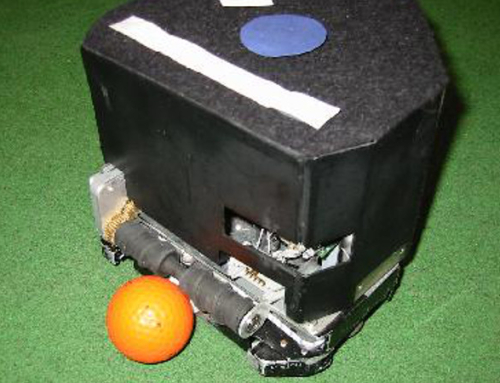Project Description
My PhD thesis project was “Reading the Play – Adaptation by Prediction”. The basis for the approach was akin to an elite sports player being able to “read the play”, allowing for decisions to be made based on predictions of likely future outcomes.
Using Markov chains we could model the opponent behaviour to prediction their likely future state. This brief video shows the prediction system at work in the RoboRoo robot soccer simulator. The circle is my system’s predict of the agent’s position in one second, and the triangle is the first order (velocity) estimation.
Gordon Wyeth was my advisor.
I also tried to categorise the agent adaptation literature. Here is how I approached it.
- Techniques in the adaptation by reinforcement category directly connect performance evaluations of the agent‟s actions with a mechanism that updates the way the agent thinks. For approaches in this category, the agent does not try to understand the cause of adaptation; however, it is powerful because the agent is not limited by preconceived notions of the environment or task.
- Techniques in the adaptation by classification category attempt to have a predefined response or strategy for all possible situations that might occur. This approach can work well when the responses cover and match the possible range of situations. Approaches in this category contrast with the first approach as the learning or designing phase occurs before deployment.
- The third category consists of approaches that model or predict the environment for use as a resource for future planning. These approaches combine sensing of the current state with online learning to make predictions about the future state.
Publications
D. Ball and G. Wyeth (2008) Reading the Play – Adaptation by Prediction of Agent Motion, Proceedings of the 2008 Australasian Conference on Robotics and Automation (ACRA), Canberra, Australia
D. Ball and G. Wyeth (2005) Predicting the State of Agents Using Motion and Occupancy Grids, The First International Workshop on Multi-Agent Robotic Systems (MARS), Barcelona, Spain.
D. Ball and G. Wyeth (2004) Modeling and Exploiting Behavior Patterns in Dynamic Environments, 2004 IEEE/RSJ International Conference on Intelligent Robots and Systems (IROS), Sendai, Japan.
D. Ball and G. Wyeth (2003) Classifying an Opponent’s Behaviour in Robot Soccer, Proceedings of the 2003 Australasian Conference on Robotics and Automation (ACRA), Brisbane, Australia.

